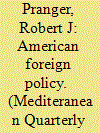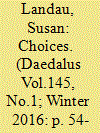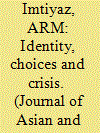| Srl | Item |
| 1 |
ID:
087845


|
|
|
|
|
| Publication |
2009.
|
| Summary/Abstract |
A new American president will now confront the extraordinary complexity of his country's foreign policy. Presidents, even without foreign affairs backgrounds, have already formed ideas about basic directions that the nation's international policies should take, and it is these fundamental inclinations to which this essay addresses itself, an essay divided into four parts: (1) types of foreign policy, (2) some recent examples of presidential choices about direction, (3) future possibilities for a new administration that entered office in January 2009, and (4) limitations on the foreign policy choices of the new president-the old bugaboo of priorities.
|
|
|
|
|
|
|
|
|
|
|
|
|
|
|
|
| 2 |
ID:
144199


|
|
|
|
|
| Summary/Abstract |
The Internet's original design provided a modicum of privacy for users; it was not always possible to determine where a device was or who was using it. But a combination of changes, including “free” Internet services, increasing use of mobile devices to access the network, and the coming “Internet of Things” (sensors everywhere) make surveillance much easier to achieve and privacy more difficult to protect. Yet there are also technologies that enable communications privacy, including address anonymizers and encryption. Use of such technologies complicate law-enforcement and national-security communications surveillance, but do not completely block it. Privacy versus surveillance in Internet communications can be viewed as a complex set of economic tradeoffs–for example, obtaining free services in exchange for a loss of privacy; and protecting communications in exchange for a more expensive, and thus less frequently used, set of government investigative techniques–and choices abound.
|
|
|
|
|
|
|
|
|
|
|
|
|
|
|
|
| 3 |
ID:
121829


|
|
|
|
|
| Publication |
2013.
|
| Summary/Abstract |
This study attempts to understand the choices made by Muslim political leaders in general, and after independence in particular. Muslim leadership has been broadly classified into two categories based on their respective agendas. This paper looks critically at the choices made by Muslim leaders, as well as some state concessions that could have contributed to growing Islamic fundamentalism. It finally suggests some measures to the current problems of (North and East) Muslims: socio-economic concessions and local power-sharing.
|
|
|
|
|
|
|
|
|
|
|
|
|
|
|
|